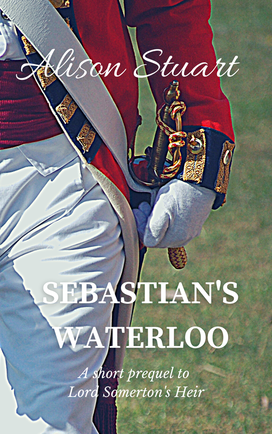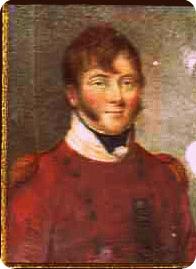SEBASTIAN'S WATERLOO
The idea for LORD SOMERTON'S HEIR was born on the battle field of Waterloo on a flying visit in 2005. As it turned out that particular story starts not with Waterloo, but in the days after Waterloo, but I had always wanted to look at Sebastian's experience of the battle. My more recent visit to Waterloo on the eve of the bicentennial in June 2015, sparked the kernel for this story... SEBASTIAN'S WATERLOO.
A short prequel to Lord Somerton's HeirBefore Lord Somerton*, he was just plain Captain Alder, a penniless career officer in Wellington’s army.
As Napoleon makes his last great bid for power, he will meet an Iron Duke and an indomitable force of English and allied troops in the fields just south of a little village called Waterloo. For Sebastian Alder, the events of June 18, 1815 will change his life forever... |
Historical notes:
The sharp eyed among you (who may have read LORD SOMERTON'S HEIR) might have noticed that I created a problem for myself. Sebastian Alder's regiment, the 22nd Regiment of Foot (the Cheshire Regiment) was not at Waterloo. In fact it was thousands of miles away - in Mauritius. Fortunately officers moved fairly easily between regiments wherever vacancies occurred, although the usual practice was to buy into the vacancy. Sebastian, as a penniless captain with a field promotion following his 'heroic' actions at Talavera had no money to buy commissions so I assigned him from a staff job to the adjutancy of the 40th Regiment of Foot (the Somerset Regiment), the Fighting Fortieth.
In researching the role the 40th played on the field of Waterloo, it is hard to go past the story of its commander, Major Arthur Heyland, who fell in the last hour of the battle, as described in the story. The letter Heyland wrote on the eve of Waterloo sent goosebumps down my spine as the man foreshadowed his death the following day. The full text of the letter is reproduced below. For more detail on the life and death of Major Heyland, I am indebted to the following source: http://british-cemetery-elvas.org/heyland.html
I would also like to acknowledge the following sources in my research:
http://www.lancashireinfantrymuseum.org.uk/waterloo/
http://www.nam.ac.uk/research/famous-units/40th-2nd-somersetshire-regiment-foot
Wikipedia - various articles.
Just a quick post script - As part of its illustrious history, the 40th Regiment of Foot was sent to Australia in the 1820s and again in the 1850s when it was the regiment dispatched to deal with the rebellious miners at the Eureka Stockade
The sharp eyed among you (who may have read LORD SOMERTON'S HEIR) might have noticed that I created a problem for myself. Sebastian Alder's regiment, the 22nd Regiment of Foot (the Cheshire Regiment) was not at Waterloo. In fact it was thousands of miles away - in Mauritius. Fortunately officers moved fairly easily between regiments wherever vacancies occurred, although the usual practice was to buy into the vacancy. Sebastian, as a penniless captain with a field promotion following his 'heroic' actions at Talavera had no money to buy commissions so I assigned him from a staff job to the adjutancy of the 40th Regiment of Foot (the Somerset Regiment), the Fighting Fortieth.
In researching the role the 40th played on the field of Waterloo, it is hard to go past the story of its commander, Major Arthur Heyland, who fell in the last hour of the battle, as described in the story. The letter Heyland wrote on the eve of Waterloo sent goosebumps down my spine as the man foreshadowed his death the following day. The full text of the letter is reproduced below. For more detail on the life and death of Major Heyland, I am indebted to the following source: http://british-cemetery-elvas.org/heyland.html
I would also like to acknowledge the following sources in my research:
http://www.lancashireinfantrymuseum.org.uk/waterloo/
http://www.nam.ac.uk/research/famous-units/40th-2nd-somersetshire-regiment-foot
Wikipedia - various articles.
Just a quick post script - As part of its illustrious history, the 40th Regiment of Foot was sent to Australia in the 1820s and again in the 1850s when it was the regiment dispatched to deal with the rebellious miners at the Eureka Stockade
Major Heyland's letter to his wife... written at Waterloo on 17 June 1815
What I recommend my love in case I fall in the ensuing contest, is that my sons may be educated at the Military College, except Arthur, who is hardly strong enough: the hazards of a military life are considerable, but still it has its pleasures, and it appears to me of no consequence whether a man dies young or old, provided he be employed in fulfilling the duties of the situation he is placed in in this world.
I would wish my son John, whose early disposition has made us both happy, should serve in the Infantry till he is a Lieutenant, and then by money or interest be removed to a Regiment of Light Cavalry. I trust his gentlemanly manner and his gallantry in the Field will make his life agreeable. Kyffin might try the Artillery Service and make it an object to be appointed to the Horse Artillery, which he can only hope for by applying himself to the duties of his profession. Alfred must get in a Regiment of Infantry, the 95th for instance, and my young unborn must be guided by his brother John and by your wishes.
For yourself, my dearest, kindest Mary, take up your residence in Wales, or elsewhere if you prefer it, but I would advise you, my love, to choose a permanent residence. My daughters, may they cling to their mother and remember her in every particular.
My Mary, let the recollection console you that the happiest days of my life have ....... from your love and affection, and that I die loving only you, and with a fervent hope that our souls may be reunited hereafter and part no more.
What dear children, my Mary I leave you. My Marianna, gentlest girl, may God bless you. My Anne, my John, may Heaven protect you. My children may you all be happy and may the reflection that your father never in his life swerved from the truth and always acted from the dictates of his conscience, preserve you, virtuous and happy, for without virtue there can be no happiness.
My darling Mary I must tell you again how tranquilly I shall die, should it be my fate to fall, we cannot, my own love, die together - one or other must witness the loss of what we love most. Let my children console you, my love. My Mary. My affairs will soon improve and you will have a competency - do not let too refined scruples prevent you taking the usual Government allowance for Officers' children and widows. The only regret I shall have in quitting this world will arise from the sorrow it will cause you and your children and my dear Marianne Symes. My mother will feel my loss yet she possesses a kind of resignation to these inevitable events which will soon reconcile her.
I have no desponding ideas on entering the Field, but I cannot help thinking it almost impossible I should escape either wounds or death.
"My love, I cannot improve the Will I have made, everything is left at your disposal. When you can get a sum exceeding £10,000 for my Irish property, I should recommend you to part with it and invest the money, £6,000 at least, in the funds, and the rest in such security as may be unexceptionable. You must tell my dear brother that I expect he will guard and protect you, and I trust he will return safe to his home.
A R H
Thank you to Escape Publishing for permission to publish this short story

